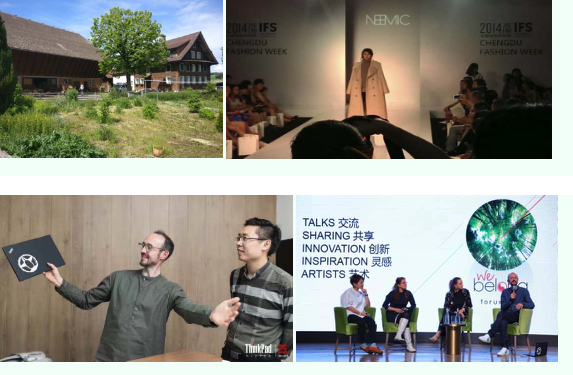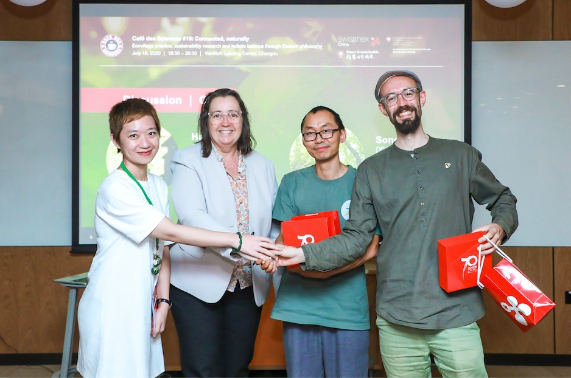By Cissy Sun, Head of Art-Science at swissnex China
On July 16, 2020, our 19th Café des Sciences Lecture – Connected, naturally was held successfully at Wework Chengdu. This was our first offline event co-organized with Consulate General of Switzerland in Chengdu and was the first Café des Science Lecture hosted outside of Shanghai. Over 50 guests showed up despite the heavy rain. The inspiring talks by Hans Galliker and Song Shu on holistic mindset and iterative systemic shift of the Circular, Sharing- and Knowledge Economy were very well received by the partners and audiences.
Due to the time constraint, we could only present a limited number of questions. If you have further questions for our speakers regarding eco-village practice, sustainability research and the concept of “internet of mind”, please email us at artscience@swissnexchina.org. We will try our best to forward them to the speakers.
We would like express our appreciation to our speakers Hans Martin Galliker and Song Shu for sharing their valuable insights, and also to thank the Consul General of Switzerland in Chengdu Conny Camenzind, and Yufei Niu for the strong collaboration, and WeWork for providing the amazing venue!
The presentation slides are available to download here.
The photos of the event are here.
Here are some key event takeaways that we would like to share with you.
Sustainability practices and research to foster eco-villages
Presented by Hans Martin Galliker, Independent ecopreneur-in-residence at Huadao Ecovillage
Before diving into the topic, Hans shared with us his personal experience with three pillars in his life: agriculture, fashion and technology. Throughout the years, he has grown his interest in organic agriculture and environmental technology. Since 2019, Hans Galliker became an ecopreneur-in-resident at Huadao Ecovillage near Chengdu in order to foster their sustainability-related efforts. More recently, Hans co-founded the social enterprise Urban-Rural Bridge which promotes permaculture and is preparing the launch of a farm-to-table app for cooperatives including simple farm management.
Located in Chongzhou, Chengdu, Huadao eco-village is comprised of a living area with green buildings which have been built to adopt the traditional Chinese courtyard style of western Sichuan and contain individual family apartments and a communal open space and kitchen. The eco-village applies a very sustainable and sophisticated living system to its resource management, which includes regional biodiversity, green planning, water retention, energy conservation, and the refusal of unnatural land treatment. People who engage with this community learn how to share and cooperate with each other in a harmonious ecology.
During his residence at Huadao, Hans supports sustainability-oriented initiatives such as implementing a zero-waste strategy or fostering resilience of the whole ecosystem. He is also deploying private clouds, business software and also organizational self-management solutions for the eco-village. He gave a few practical examples of how the concept of circular economy, sharing economy, knowledge economy and holacracy system are applied in the eco-village.
And last but not least, the five points from Hans for everyone to remember:
Elevate your ecological consciousness with the Internet of Mind
Presented by Song Shu (Yingbing Zhou), Manager and educator for NatureDao
Song Shu grew up in Xichang, Sichuan, in an idyllic home next to a river and a mountain. His parents planted a companion tree for him when he was born. He moved to Chengdu for his studies at Southwest Jiaotong University and graduated with a Master degree in Communication Engineering. He then embarked to work in the technology sector for more than a decade, dedicated to microelectronics and networking, with a focus on IoT (Internet of Things). However, when the new life was brought to his family, he started to re-think about education and nature, and he changed his career completely. He became the co-founder of the life education company NatureDao.
Inspired by the “Internet of Things”, Song Shu developed the concept of “Internet of Mind” (IoM) and he compared the the two networks to explain how it works. To connect to the “IoM”, he suggested us to improve sensory perception through joining activities related to six senses and by learning from nature, learning in nature and learning for nature. He also shared his personal practice and experience on how to balance the movement and peace and adjust inner process. He built up a secret garden at his home and he spent much time with his son in the nature. And now he’s working on his new book “Internet of Mind”.
Q & A Session:
(To Song Shu)
I think your studies and research on Mind is very creative and groundbreaking, would you please explain more about your concept of mind?
- It’s very difficult to define as it’s different in Chinese and English. In Chinese, we use the character “心”, it’s the heart.
- We also have the philosophy of the three parts – “身、心、灵”,which is body, mind and spirit. Body is the part to interact with the world, mind is to interact with people, and the spirit is to connect at a higher level.
- Mind is too wide, so maybe it’s more accurate to use the word – consciousness.
(To Hans)
As you have traveled to a lot of places, why did you choose Huadao as your eco-village? Would it be easy to replicate the model of Huadao eco-village to other places in China or around the World?
- In my entrepreneur journey, I realize that I’m not a good manager but I’m good at supporting and working with others. I also realize that I don’t have to invent everything by myself, I’m more looking for communities to work together with. And Huadao offers a good occasion.
- Huadao is one the two eco-villages in China recognized by the Global Ecovillage Network, the other one is in Hangzhou. They are both nice, but far from being perfect.
- The eco-village mode has just started in China, and is behind the whole eco-village movement. But China is going to develop fast as the leading direction is towards sustainability and the young people in the big cities are eager to be connected to the nature and to the community.
- Ecovillage is a good answer to a lot of problems that we have in the modern world. I think there’s a potential for a lot more eco-villages to develop in China. And I’m ready to support with my background and expertise.
From left to right: Cissy Sun (Head of Art-Science at swissnex China), Conny Camenzind (Consul General of Switzerland in Chengdu), Song Shu (Manager and educator for NatureDao), Hans Martin Galliker (Independent ecopreneur-in-residence at Huadao Ecovillage)









